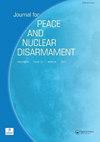实现WMDFZ中东条约:来自民间社会的见解
IF 1.4
Q4 INTERNATIONAL RELATIONS
引用次数: 0
摘要
在中东建立无大规模杀伤性武器区(WMDFZ)是几十年来的夙愿。建立“无核区”的想法已在联合国和不扩散条约审查会议等论坛上定期重新讨论。本文通过探讨为该地区制定一项有效和可持续条约的可能途径,为这一进程作出贡献。我们认为,这样一项条约可以通过一项具有约束力的法律总括性文件来实现,该文件将涵盖各国在以前的决议中确定的所有要点。我们通过强调谈判在讨论中应该面对的核心要素来分析这样一项条约的一些要素。为此,我们以民间社会组织中东条约组织(METO)自2014年以来与外交官和专家举行的一系列讨论和圆桌会议为基础。民间社会轨道为包容性进程提供了宝贵的贡献,也为今后研究民间社会如何促进不扩散和裁军谈判提供了相关的案例研究。本文章由计算机程序翻译,如有差异,请以英文原文为准。
Towards an Achievable WMDFZ Treaty for the Middle East: Insights from Civil Society
ABSTRACT Establishing a Weapons-of-Mass-Destruction-Free-Zone (WMDFZ) in the Middle East is a decades-old ambition. The idea of establishing “The Zone” has been regularly re-addressed at the United Nations and in forums like the NPT Review Conferences. This article contributes to that process by exploring possible pathways to a working and sustainable treaty crafted for the region. We argue that such a treaty could be achievable through a binding legal umbrella document that would cover all points defined by states in previous resolutions. We analyse some elements for such a treaty by highlighting core elements that negotiations should face in their discussions. For that, we build on a series of discussions and round tables previously held by the Middle East Treaty Organization (METO), a civil society organisation, with diplomats and experts, since 2014. The civil society track offered valuable contributions to an inclusive process, as well as a relevant case study for future research on how civil society can contribute to non-proliferation and disarmament negotiations.
求助全文
通过发布文献求助,成功后即可免费获取论文全文。
去求助
来源期刊

Journal for Peace and Nuclear Disarmament
INTERNATIONAL RELATIONS-
CiteScore
1.30
自引率
0.00%
发文量
36
审稿时长
12 weeks
 求助内容:
求助内容: 应助结果提醒方式:
应助结果提醒方式:


